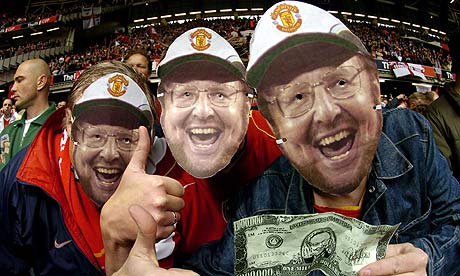
England's 20 Premier League clubs owe a total of £3.1bn in bank overdrafts, loans and other borrowings, according to the latest published financial information. The accounts for the clubs, mostly documenting the year to May, June or July 2008, show that the FA chairman, Lord Triesman, significantly underestimated football's indebtedness when he cautioned last October that debts in the sport as a whole, including the Football League and the FA itself, were at £3bn.
Manchester United and Chelsea were by far the most indebted, owing £699m and £701m respectively, Arsenal were third, with £416m debts and Liverpool, the other top four club, were understood to owe around £280m; their accounts, due to be filed at Companies House last week, are overdue.
The debts of those top four clubs, incurred in very different ways, demonstrate the extremes to which Premier League clubs' finances have been taken. United, Premier and European Champions League winners in that 2007-08 season, nevertheless made a loss of £44.8m because of the swingeing interest the club pays on its debts. United owed £699m to financial institutions because the Florida-based Glazer family, who bought the club in 2005 largely with borrowed money, then loaded their own debts on to the club. In just three years to 2008, £263m has become payable by United in interest alone.
Liverpool's debt is similar, owed by the club's holding company, and including the £185m borrowed by the north American businessmen, Tom Hicks and George Gillett, when they acquired the club in 2007.
At Chelsea, by contrast, no money is owed to banks; the entire £701m was an interest-free loan made by the club's owner, Roman Abramovich, since he bought Chelsea in 2003. The Russian oligarch has poured money in to pay for players whose wages the club would otherwise not be able to afford, in his hunger to claim football trophies. Since the accounts were published, Chelsea, partly as a response to Triesman's warning about high debt levels, announced that Abramovich had reduced his loan to £339.8m, converting the rest to shares in the club.
Arsenal is the only Premier League club that incurred significant debt to carry out long-term investment. The club borrowed £260m originally to build the new Emirates Stadium, and a further £133m to convert the old Highbury ground into flats. Arsenal have been generally admired for prudence because the Emirates, with 60,000 seats – some very expensive – generates around double the money Highbury did, but the sales of apartments have stalled in the downturn, not producing the windfall expected when property prices were booming.
The 20 clubs' accounts show that despite booming incomes, which include the first season of a record £2.7bn TV deal which runs from 2007-10, Premier League clubs increasingly rely on subsidies from the billionaires who now mostly own the clubs. Manchester United's takeover may have resulted in huge sums going out of the club in interest payments, but 15 of the 20 clubs in last season's top flight are now subsidised by owners. After Abramovich, the next highest contribution came from Mohamed Al Fayed, whose interest free loans to Fulham increased to £174m.
The smaller Premier League clubs are struggling to compete financially, and as they are desperate to avoid relegation out of football's golden circle, they have been urgently seeking backers of their own. In the last week, two more clubs have announced takeovers: Sunderland, by Dallas-based private equity investor Ellis Short, and Portsmouth, by a consortium fronted by Dubai businessman Sulaiman Al Fahim.
The Premier League defends the financial picture presented, arguing that the levels of debt are generally manageable, given rising turnovers and the improved TV deal. Most clubs did not spend all their increase on swelling footballers' already galactic pay packets; wages, for players and administrative staff, did rise to £1.095bn, but at an average 55% of turnover that is generally reckoned to be sustainable.
If making it as a top footballer or manager still furnishes the most lucrative bank balances in English football, the top clubs' directors have also seen their salaries rise way above those for directors of non-football companies with similar turnover. Ten directors in football were paid over £1m in 2007-08. Keith Edelman Arsenal's former managing director, was paid the most: £2,726,000 in total, including a £1,056,000 payoff when he left the club on 1 May 2008.
Gordon Taylor, chief executive of the Professional Footballers' Association, maintained his status as Britain's highest paid trade union official, with a salary package of £972,087.

